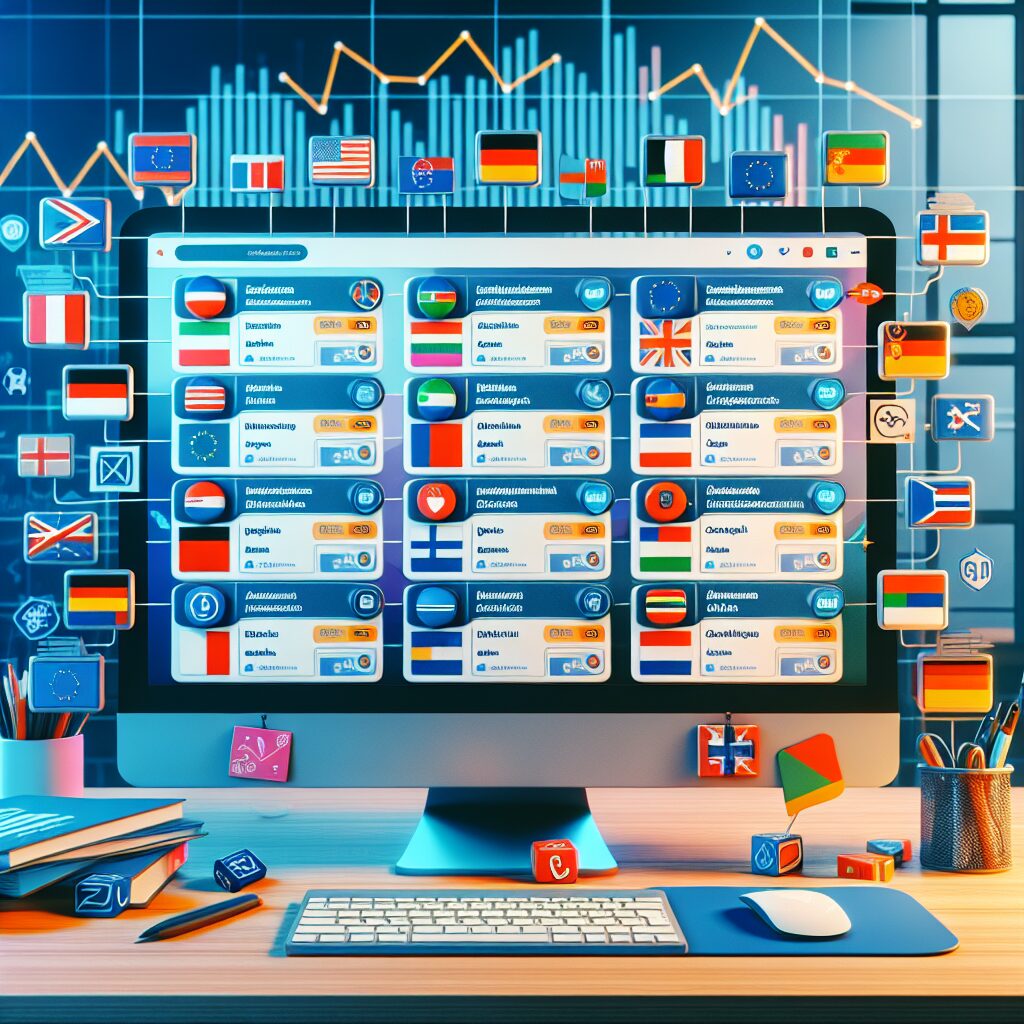About eldris
At Eldris, we automate SEO, multilingual site expansion, and EU compliance for brands scaling across Europe. Our AI-powered platform handles everything from content publishing to regulatory docs—so you don’t have to.
In This Article
- AI in eCommerce enables scalable expansion through multilingual SEO optimisation.
- Natural language processing (NLP) ensures translated content aligns with regional context and user intent.
- Workflow automation boosts ranking speed and reduces manual SEO labour.
- Human oversight remains essential to cultural accuracy and brand tone control.
- Case studies confirm that AI yields tangible growth for international eCommerce.
- Future-facing strategies should prioritise modular AI platforms and predictive search capabilities.
Why AI Matters for Global eCommerce
Beyond Borders: Scaling with Intelligence
AI in eCommerce is revolutionising how retailers scale their digital operations, enabling brands to enter international markets with unprecedented agility. The traditional approach to global expansion required dedicated regional teams, manual translation workflows, and localised campaign management—processes often riddled with high costs and human error. Now, artificial intelligence makes it possible to localise and optimise digital content across dozens of languages and regions—at speed and scale.

For global eCommerce brands, the biggest challenge isn’t just translating a product page—it’s ensuring that page performs well within a given region’s search landscape. This is where AI in eCommerce becomes a strategic lever. AI algorithms can analyse regional keyword data, user intent, and search patterns to deliver localised SEO that feels native to users across markets. In turn, businesses gain visibility, engagement, and conversions, no matter the geography. Leveraging AI doesn’t only improve scale—it amplifies SEO effectiveness.
Multilingual SEO Automation: What It Means
From Translation to Contextual Precision
Multilingual SEO automation with AI is far more sophisticated than simply translating product listings or blog articles. Traditionally, multilingual SEO required a combination of native translators, SEO specialists, and local content strategists. This multi-layered process often slowed down execution and introduced inconsistencies between languages. AI now unifies these layers by integrating translation with semantic SEO and market-specific search performance optimisation.
Natural language processing (NLP) is central to this capability. AI tools trained in NLP can generate keyword-rich content in multiple languages while preserving contextual meaning, tone, and user intent—a feat nearly impossible using machine translation alone. More importantly, these tools continuously analyse local SEO trends to refine and improve content accuracy. As a result, eCommerce platforms not only go multilingual—they do so with purpose, resonating authentically with each target audience. That’s the power of AI in eCommerce: contextual multilingual performance at scale.
“Machine learning and natural language AI now allow eCommerce companies to generate authentic, optimised content in over 50 languages—without compromising SEO integrity.”
AI Tools That Support International SEO
Multiple AI-driven platforms now cater explicitly to global SEO. Tools like DeepL and Weglot provide intelligent translations that adapt tone and syntax across languages. MarketMuse and Semrush integrate AI-enhanced keyword clusters into multilingual strategies, while SurferSEO tailors on-page optimisation by language-specific search intent. Moreover, dedicated platforms like Eldris AI merge NLP, predictive analytics, and localisation workflows into a single interface designed for scalable eCommerce success. When selecting AI tools for multinational SEO, businesses should prioritise integration capabilities, language breadth, and ongoing algorithm training.
How AI Transforms SEO Workflow Automation
AI-driven workflow automation redefines how SEO teams operate. Rather than manually identifying new keywords or crafting meta tags for each language, AI tools automate these tasks using real-time market insights. For example, a single eCommerce category page can have AI-generated meta descriptions suited for the UK, Spain, and Germany—each one optimised per Google’s local crawling behaviour. Beyond copywriting, AI monitors ranking changes and user interactions, prompting automatic content updates when necessary. This closed-loop automation accelerates global ranking gains while decreasing manual interventions by up to 70%.
Overcoming Localisation Barriers with AI
Localisation is more than just translation—it’s tailoring content to cultural nuances, idiomatic expression, and local SEO norms. AI now bridges this gap by learning from vast datasets of native-language digital behaviour. For instance, AI can identify when UK shoppers seek “trainers” while US clients prefer “sneakers”, automatically aligning terminology to match regional expectations. Furthermore, AI adjusts HTML attributes, hreflang tags, and schema markups to suit localised site performance. This leads to faster load times, better indexing, and improved UX-target alignment.
One crucial benefit of AI in eCommerce is its ability to continuously learn. When platforms integrate feedback loops from user interactions, the AI becomes progressively better at anticipating buyer behaviour and adjusting content accordingly. By doing so, localisation is no longer an afterthought—it becomes a proactive, AI-guided strategy for global growth.
Generating SEO-ready Content Across Languages
Creating optimised eCommerce content for multiple languages used to be prohibitively expensive. With AI-powered content generation, brands can now create thousands of product descriptions, category pages, and blog articles tailored for each region—all in a fraction of the time. These tools leverage datasets that include regional search intent, competitor language patterns, and seasonal relevance. The result? Content that is not only grammatically accurate, but strategically aligned with what each market is searching for.
Moreover, AI helps maintain consistency across all language variants. This is particularly important for brand messaging. A global fashion retailer, for instance, can ensure that its Italian, French, and Dutch on-site copy all reflect a unified voice—thanks to AI’s tone modelling capabilities. Some platforms even allow companies to train AI models using their historical brand materials, enhancing brand fidelity. For detailed insight into brand consistency in multilingual content, Learn more about Multilingual eCommerce SEO Strategies Powered by AI provides helpful guidance.
Human Oversight in AI SEO: Striking the Balance
While AI brings unmatched speed and scalability, human oversight remains essential for success. AI excels at data analysis, pattern recognition, and content generation, but human strategists provide the emotional intelligence and cultural discernment necessary for brand resonance. Most effective SEO workflows blend AI automation with editorial quality checks. Editors validate that local idioms make sense, product benefits feel relevant within a regional context, and calls-to-action align with cultural expectations.
Brands should also consider implementing approval workflows that mix AI drafts with human editing. This hybrid model not only reduces time-to-market but also ensures compliance, accuracy, and tone alignment. Ultimately, AI in eCommerce is a strategic enabler—not a one-size-fits-all solution. Human touchpoints are key to preserving brand equity and customer trust across regions. For more insights into editing AI-generated content for SEO compliance, see Read a related article.
Real-world Case Studies: Multilingual Success
Several notable eCommerce brands have demonstrated how AI can drive multilingual SEO success. One European skincare brand used Eldris AI to deploy SEO-optimised landing pages in 12 languages within four weeks. Traffic from non-English markets increased by 67% within 90 days. Another case involved a B2B equipment supplier entering Southeast Asia. By using AI to localise product terminology and specifications, they observed a 300% increase in organic lead conversions from Thailand and Vietnam.
In the fashion sector, a British luxury retailer employed AI to refine country-specific metadata and schema for its core product lines. This resulted in a climb from page 3 to page 1 on Google SERPs in Spain and Italy. These real-world examples demonstrate that AI doesn’t simply support multilingual SEO—it drives measurable outcomes. Curious to explore tools used in these cases? Check Learn how artificial intelligence works in eCommerce for software comparisons and testimonials.
Common Pitfalls in AI-powered SEO Implementation
Despite its advantages, careless deployment of AI can cause serious setbacks. Poorly configured AI systems may generate content that is factually incorrect, culturally tone-deaf, or keyword-stuffed to the point of penalty. Over-automation often results in neglected readability audits, leading to user bounce and increased pogo-sticking—especially within mobile-first markets. It’s also vital not to assume that translation equals localisation. Direct machine translation, without context, frequently misses culturally relevant phrasing and micro-intents critical for conversion.
Furthermore, many companies fail to benchmark performance pre- and post-AI rollout, making it harder to quantify ROI. To avoid these issues, businesses must treat AI not as a magic wand, but as an intelligent assistant grounded in governance. Proper training, feedback loops, and A/B testing can refine implementation. The goal is to deploy AI that enhances human creativity without shortcutting strategic thinking.
Future-Proofing Your Strategy with AI
The pace of AI innovation suggests that businesses must constantly adapt. With developments in generative AI, conversational search, and visual AI (such as image-based SEO tagging), the future of multilingual eCommerce is poised for even more disruption. Companies investing in AI tools today must ensure they are flexible and continuously upgraded to meet new algorithm changes, device formats, and customer expectations.
AI in eCommerce is moving toward anticipatory SEO—where systems predict shifts in search demand before they happen. Positioning your business to capitalise on this trend ensures not only future visibility but also long-term loyalty. Strategic investments should aim at platforms offering modular functionality, strong analytics, and API versatility. That way, your AI infrastructure can evolve alongside your business needs and global ambitions.
Conclusion: Powering Global Reach with Eldris AI
To remain competitive in international markets, brands must embrace AI not as a tool but as a pillar of their eCommerce architecture. AI in eCommerce allows companies to streamline multilingual SEO, automate content generation, and localise user experiences at scale. The result is a potent blend of operational efficiency and cultural relevance. Platforms like Eldris AI offer purpose-built features that turn global ambitions into digital realities. The path to expanding your brand globally while maintaining local impact has never been this accessible—or this intelligent.
Great guide on optimizing-ecommerce-growth-ais-role-in-multilingual-seo – Community Feedback
How does AI enhance multilingual SEO for eCommerce?
AI automates keyword research, content translation, and localizes SEO strategies to improve eCommerce global visibility and reach in multiple languages.
What are the benefits of using AI in eCommerce SEO?
AI improves ranking, streamlines workflows, enables automation for content and link building, and personalizes user experience for international customers.
Can AI-powered tools replace manual SEO processes?
While AI enhances efficiency and accuracy, human oversight is still key for strategy and nuanced localization, especially in multilingual markets.








